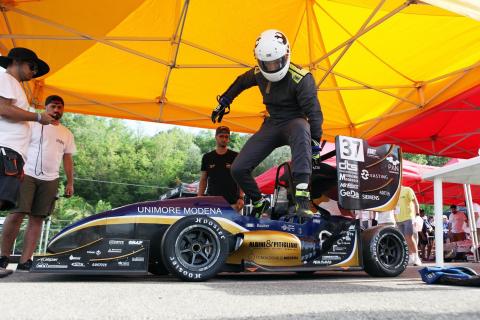Degree Class L-9 - Degree Class Industrial Engineering
The students' initial preparation is tested by administering a multiple-choice test with four different sections: mathematics, logic, science and verbal comprehension.
automatically translated page
The degree course in Mechanical Engineering is characterised by strong links to the numerous mechanical industries in the area, where graduates easily find employment.
It is divided into two curricula: General Curriculum; Materials Curriculum. In the first part of the Degree Course, common to the two curricula, basic knowledge in mathematics, physics and chemistry is provided and consolidated in order to enable students to adequately understand the methodological-operational aspects and to be able to use this knowledge to interpret and describe engineering problems.
The General Curriculum provides the opportunity to acquire a wide-ranging knowledge of the traditional topics of the mechanical industry, such as mechanical design, thermodynamics, energy conversion systems and the operating principles of their fluid machines, analysis of mechanisms and their dimensioning, mechanical technology.
The Materials Curriculum provides the opportunity to study topics more related to materials in use in industry, such as the fundamentals of polymeric and composite materials and the fundamentals of materials selection and tribology
The main occupational sector is manufacturing, consisting in particular of the mechanical, electromechanical, chemical, automation and robotics industries involved in the production of machines, components, systems and plants.
The choice of curriculum is made at the end of year II, in May. The student will be notified by e-mail of the change period.


The members of the Study Course Councils (CdS) are defined annually on the basis of the prevailing teaching loads.
Each Council is assisted in the planning and/or revision of the educational offering by a Steering Committee, which meets at least once a year.
The Bachelor's Degree in Mechanical Engineering is a programme-based course; in order to be admitted, you must take part in the call for applications.
The study plan must include, in addition to compulsory training activities, training activities of the student's choice (12 CFU) and other activities (3 CFU), pursuant to Article 10, paragraph 5, letter d of DM270, for a total of 15 CFU, choosing them from those envisaged by the Course of Studies as optional.
Students who have not completed their study plan within the prescribed period are assigned a standard-statutory study plan which becomes their compulsory plan and which envisages the following courses for the acquisition of the 15 CFU as electives: Safety of Industrial Plants (6 CFU) and Electrical Machines and Drives (6 CFU), Advanced English (3 CFU).
This statutory plan is valid for both curricula, General and Materials.Useful information for students enrolled in courses according to DM270/04.
CURRICULUM
The Mechanical Engineering degree course has established the obligation for all students to compile a study plan. The study plan must be submitted during the 3rd year of the course, roughly between October and November (dates to be confirmed each year).
Compilation must normally be carried out via the Web on Esse3, at the address, 'Career Plan', and only in special cases on paper using the special form distributed at the Engineering Student Secretariat (Via Campi 213/b).
Please note that a student who has not completed his or her study plan within the prescribed period will be assigned a compulsory standard study plan that will become his or her actual plan.
TECHNICAL INFORMATION ON THE ONLINE
COMPILATION The completion of the online
plan provides two filling-in alternatives, which can be viewed once you have entered the personal area:
- an 'outline plan'-APPR- whereby the completed plan is automatically approved: only the courses offered by the Mechanical Engineering degree course are offered in this pathway
- a "plan outline" -PROP- which remains in a state of evaluation (it must be approved by the Degree Course Council) and which must only be chosen by:
- students coming from a transfer/transfer from another Degree Course/Academic Institution who have had optional examinations recognised and already approved by their own Degree Course Council and uploaded onto the electronic booklet. Only in the case in which the cfu of the passing/transfer resolution exceeds 18 cfu (the PROP plan foresees a 183 cfu closure), the compilation of the plan must be carried out by means of the special paper form available at the Student Secretariat in via Campi 213/b before the deadline during reception hours; -
students who have taken optional examinations in Erasmus that have already been approved by resolution of their Degree Course Council and uploaded onto the electronic booklet; - students who are sure to take part in the Formula Student project, after having asked the Student secretariat to upload the teaching activity onto the booklet;
- students who wish to sit extra-xams in Mechanics, after having asked the Student secretariat to upload the teaching activities to their transcripts; it is advisable, if one intends to sit extra-xams, to obtain prior information from the President of the Degree Course, in order to avoid non-approval, which would lead, in the event that the extra-xams have already been taken, to NOT being able to consider them in one's career (since they will be considered supernumerary) and therefore requiring one to sit further exams.
Plans in PROP status will be evaluated by the Course Council following the deadline for plan compilation.
The student will be contacted if the plan is rejected for re-completion.
This document illustrates the final exam for students enrolled in courses under DM270/04 and describes the procedure to be followed in order to be admitted.
BSc in Mechanical Engineering
The final examination is a public oral test aimed at ascertaining the achievement of the specific educational objectives of the degree course. It may consist of:
- a) in the presentation and discussion of a report on the activity carried out during the traineeship - carried out under the supervision of a lecturer/researcher - in industries, companies or external bodies, on the basis of appropriate agreements;
- b) in the presentation and discussion of a report on the activity carried out - under the supervision of a lecturer/researcher - at research laboratories of the University of Modena and Reggio Emilia or of other public or private research bodies, on the basis of specific agreements;
- c) in the presentation and discussion of a paper on topics related to subjects in the study plan, assigned by a lecturer/researcher.
Students, after having obtained no less than 140 CFU, agree with a lecturer/researcher on the subject of the Final Examination. This lecturer/researcher (known as the Final Examination Tutor) supervises the preparation of the Final Examination.
The Examination Board assesses the Final Examination and, in the event of a passing grade, awards a full mark from 0 to 3 hundredths, taking into account the quality of the work carried out and the expository capacity demonstrated. The Examination Board transmits the score of the final test to the President of the SCC.
Tutoring, in compliance with the provisions of Article 13 of Law 341/90, is a service designed to assist students enrolled at university throughout their studies, removing obstacles to successful course attendance and encouraging active participation in university life.
The tutor is a point of reference to whom one can turn for advice, for help in getting into one's studies and for all forms of assistance aimed at making university studies more effective and productive.
The tutor teacher in particular can provide methodological and didactic support, aimed at overcoming learning difficulties (e.g. preparing for an exam, relating the contents of the various disciplines, clarifying doubts on study subjects) or can contact students in difficulty directly to propose support actions arranged by the University.
The reference teachers are:
The compulsory propaedeuticities for the cohort* of students enrolled in the 2024/2025 academic year are:
| TEACHING | SSD | SEM | CFU | PROPAEDEUTICITY |
|---|---|---|---|---|
| I YEAR | ||||
| Mathematical Analysis I | MAT/05 | I | 9 | Ofa |
| General Physics | FIS/01-03 | I and II | 12 | Ofa |
| Industrial technical drawing | ING-IND/15 | I | 6 | |
| Chemistry | CHIM/07 | II | 6 | |
| Mathematical Analysis II | MAT/05 | II | 9 | Ofa |
| Geometry and Linear Algebra | MAT/03 | II | 6 | Ofa |
| English | L-LIN/12 | II | 3 | |
| II ACTIVE YEAR | ||||
| Rational Mechanics | MAT/07 | I | 9 | Mathematical Analysis I |
| Materials Science and Metallurgy | ING-IND/21 | I | 9 | Chemistry |
| Technical Physics | ING-IND/10 | I and II | 12 | Mathematical Analysis I, Analysis II, General Physics |
| Electrical Engineering and Electrical Machines | ING-IND/31 | II | 9 | |
| Numerical Calculation and Softw. Matem. | MAT/08 | II | 9 | Mathematical Analysis I, Mathematical Analysis II, Geometry and Linear Algebra |
| Foundations of Machine Construction | ING-IND/14 | II | 6 | Mathematical Analysis I, English |
| III ACTIVE YEAR | ||||
| Common to both CVs | ||||
| Machine Construction | ING-IND/14 | I | 9 | English, Fundamentals of Machine Building |
| Advanced English | L-LIN/12 | II | 3 | English |
| General Curriculum | ||||
| Energy Machines and Systems | ING-IND/09 | I | 12 | English, Mathematical Analysis I, Technical Physics |
| Mechanical Technology | ING-IND/16 | I | 12 | English, Industrial Technical Drawing |
| Applied Machine Mechanics | ING-IND/13 | II | 12 | Rational Mechanics, Numerical Calculation and Mathematical Software, English |
| Fundamentals of Mechanical Installations | ING-IND/17 | II | 6 | English, Technical Physics |
| Fundamentals of design and CAD | ING-IND/15 | II | 6 | Industrial technical drawing, English |
| Materials Curriculum | ||||
| Computer-Aided Design | ING-IND/15 | I | 6 | English |
| Machines and Hydraulics | ING-IND/08 | I | 6 | English, Technical Physics |
| Mechanical Technology | ING-IND/16 | I | 6 | English, Industrial Technical Drawing |
| Applied Machine Mechanics | ING-IND/13 | II | 6 | Rational Mechanics, General Physics, English |
| Polymers and composites | ING-IND/22 | I and II | 12 | Materials Science and Metallurgy, English |
| Material Selection and Tribology | ING-IND/21-22 | I and II | 12 | Materials Science and Metallurgy, English |
Compulsory propaedeuticities are defined for each course with the aim of facilitating full enjoyment of the teaching provided.
The compulsory propaedeuticities for the cohort* of students enrolled in the 2023/2024 academic year are:
| TEACHING | SSD | SEM | CFU | PROPAEDEUTICITY |
|---|---|---|---|---|
| I YEAR | ||||
| Mathematical Analysis I | MAT/05 | I | 9 | Ofa |
| General Physics | FIS/01-03 | I and II | 12 | Ofa |
| Industrial technical drawing | ING-IND/15 | I | 6 | |
| Chemistry | CHIM/07 | II | 6 | |
| Mathematical Analysis II | MAT/05 | II | 9 | Ofa |
| Geometry and Linear Algebra | MAT/03 | II | 6 | Ofa |
| English | L-LIN/12 | II | 3 | |
| II ACTIVE YEAR | ||||
| Rational Mechanics | MAT/07 | I | 9 | Mathematical Analysis I |
| Materials Science and Metallurgy | ING-IND/21 | I | 9 | Chemistry |
| Technical Physics | ING-IND/10 | I and II | 12 | Mathematical Analysis I, General Physics |
| Electrical Engineering and Electrical Machines | ING-IND/31 | II | 9 | |
| Numerical Calculation and Softw. Matem. | MAT/08 | II | 9 | Mathematical Analysis I, Mathematical Analysis II, Geometry and Linear Algebra |
| Foundations of Machine Construction | ING-IND/14 | II | 6 | Mathematical Analysis I, English |
| III ACTIVE YEAR | ||||
| Common to both CVs | ||||
| Machine Construction | ING-IND/14 | I | 9 | English, Fundamentals of Machine Building |
| Advanced English | L-LIN/12 | II | 3 | English |
| General Curriculum | ||||
| Energy Machines and Systems | ING-IND/09 | I | 12 | English, Mathematical Analysis I, Technical Physics |
| Mechanical Technology | ING-IND/16 | I | 12 | English, Industrial Technical Drawing |
| Applied Machine Mechanics | ING-IND/13 | II | 12 | Rational Mechanics, Numerical Calculation and Mathematical Software |
| Fundamentals of Mechanical Installations | ING-IND/17 | II | 6 | English, Technical Physics |
| Fundamentals of design and CAD | ING-IND/15 | II | 6 | Industrial technical drawing, English |
| Materials Curriculum | ||||
| Computer-Aided Design | ING-IND/15 | I | 6 | English |
| Machines and Hydraulics | ING-IND/08 | I | 6 | English, Technical Physics |
| Mechanical Technology | ING-IND/16 | I | 6 | English, Industrial Technical Drawing |
| Applied Machine Mechanics | ING-IND/13 | II | 6 | Rational Mechanics, Numerical Calculation and Mathematical Software |
| Polymers and composites | ING-IND/22 | I and II | 12 | Materials Science and Metallurgy, English |
| Material Selection and Tribology | ING-IND/21-22 | I and II | 12 | Materials Science and Metallurgy, English |
The compulsory propaedeuticities for the cohort* of students enrolled in the 2022/2023 and 2021/2022 academic years are:
| TEACHING | SSD | SEM | CFU | PROPAEDEUTICITY |
|---|---|---|---|---|
| I YEAR | ||||
| Mathematical Analysis I | MAT/05 | I | 9 | Ofa |
| General Physics | FIS/01-03 | I and II | 12 | Ofa |
| Industrial technical drawing | ING-IND/15 | I | 6 | |
| Chemistry | CHIM/07 | II | 6 | |
| Mathematical Analysis II | MAT/05 | II | 9 | Ofa |
| Geometry and Linear Algebra | MAT/03 | II | 6 | Ofa |
| English | L-LIN/12 | II | 3 | |
| II ACTIVE YEAR | ||||
| Rational Mechanics | MAT/07 | I | 9 | Mathematical Analysis I |
| Materials Science and Metallurgy | ING-IND/21 | I | 9 | Chemistry |
| Technical Physics | ING-IND/10 | I and II | 12 | Mathematical Analysis I, General Physics |
| Electrical Engineering and Electrical Machines | ING-IND/31 | II | 9 | |
| Numerical Calculation and Softw. Matem. | MAT/08 | II | 9 | Mathematical Analysis I, Mathematical Analysis II, Geometry and Linear Algebra |
| Foundations of Machine Construction | ING-IND/14 | II | 6 | Mathematical Analysis I, English |
| III ACTIVE YEAR | ||||
| Common to both CVs | ||||
| Machine Construction | ING-IND/14 | I | 9 | English, Fundamentals of Machine Building |
| Advanced English | L-LIN/12 | II | 3 | English |
| General Curriculum | ||||
| Energy Machines and Systems | ING-IND/09 | I | 12 | English, Mathematical Analysis I, Technical Physics |
| Mechanical Technology | ING-IND/16 | I | 12 | English, Industrial Technical Drawing |
| Applied Machine Mechanics | ING-IND/13 | II | 12 | English, Mathematical Analysis II, Rational Mechanics |
| Fundamentals of Plant and Logistics | ING-IND/17 | II | 6 | English, Number Calculation and Mathematical Software |
| Fundamentals of design and CAD | ING-IND/15 | II | 6 | Industrial technical drawing, English |
| Materials Curriculum | ||||
| Computer-Aided Design | ING-IND/15 | I | 6 | English |
| Machines and Hydraulics | ING-IND/08 | I | 6 | English, Technical Physics |
| Mechanical Technology | ING-IND/16 | I | 6 | English, Industrial Technical Drawing |
| Applied Machine Mechanics | ING-IND/13 | II | 6 | English, Mathematical Analysis II, Rational Mechanics |
| Polymers and composites | ING-IND/22 | I and II | 12 | Materials Science and Metallurgy, English |
| Material Selection and Tribology | ING-IND/21-22 | I and II | 12 | Materials Science and Metallurgy, English |
The compulsory propaedeuticities for the cohort* of students enrolled in the 2020/2021 academic year are:
| TEACHING | SSD | SEM | CFU | PROPAEDEUTICITY |
|---|---|---|---|---|
| I YEAR 2020/2021 | ||||
| Mathematical Analysis I | MAT/05 | I | 9 | Ofa |
| General Physics | FIS/01-03 | I and II | 12 | Ofa |
| Industrial technical drawing | ING-IND/15 | I | 6 | |
| Chemistry | CHIM/07 | II | 6 | |
| Mathematical Analysis II | MAT/05 | II | 9 | Ofa |
| Geometry and Linear Algebra | MAT/03 | II | 6 | Ofa |
| English | L-LIN/12 | II | 3 | |
| II ACTIVE YEAR 2021/2022 | ||||
| Rational Mechanics | MAT/07 | I | 9 | Mathematical Analysis I |
| Materials Science and Metallurgy | ING-IND/21 | I | 9 | Chemistry |
| Technical Physics | ING-IND/10 | I and II | 12 | Mathematical Analysis I, General Physics |
| Electrical Engineering and Electrical Machines | ING-IND/31 | II | 9 | |
| Numerical Calculation and Softw. Matem. | MAT/08 | II | 9 | Mathematical Analysis I, Mathematical Analysis II, Geometry and Linear Algebra |
| Foundations of Machine Construction | ING-IND/14 | II | 6 | Mathematical Analysis I, English |
| III ACTIVE YEAR 2022/2023 | ||||
| Common to both CVs | ||||
| Machine Construction | ING-IND/14 | I | 9 | English, Fundamentals of Machine Building |
| Advanced English | L-LIN/12 | II | 3 | English |
| General Curriculum | ||||
| Energy Machines and Systems | ING-IND/09 | I | 12 | English, Mathematical Analysis I, Technical Physics |
| Mechanical Technology | ING-IND/16 | I | 12 | English, Industrial Technical Drawing |
| Applied Machine Mechanics | ING-IND/13 | II | 12 | English, Mathematical Analysis II, Rational Mechanics |
| Fundamentals of Plant and Logistics | ING-IND/17 | II | 6 | English, Technical Physics |
| Fundamentals of design and CAD | ING-IND/15 | II | 6 | Industrial technical drawing, English |
| Materials Curriculum | ||||
| Computer-Aided Design | ING-IND/15 | I | 6 | English |
| Machines and Hydraulics | ING-IND/08 | I | 6 | English, Technical Physics |
| Mechanical Technology | ING-IND/16 | I | 6 | English, Industrial Technical Drawing |
| Applied Machine Mechanics | ING-IND/13 | II | 6 | English, Mathematical Analysis II, Rational Mechanics |
| Polymers and composites | ING-IND/22 | I and II | 12 | Materials Science and Metallurgy, English |
| Material Selection and Tribology | ING-IND/21-22 | I and II | 12 | Materials Science and Metallurgy, English |
The mandatory propaedeuticities for the cohort* of students enrolled in the 2019/2020 academic year are:
| TEACHING | SSD | SEM | CFU | PROPAEDEUTICITY |
|---|---|---|---|---|
| I YEAR 2019/2020 | ||||
| Mathematical Analysis I | MAT/05 | I | 9 | Ofa |
| General Physics | FIS/01-03 | I and II | 12 | Ofa |
| Industrial technical drawing | ING-IND/15 | I | 6 | |
| Chemistry | CHIM/07 | II | 6 | |
| Mathematical Analysis II | MAT/05 | II | 9 | Ofa |
| Geometry and Linear Algebra | MAT/03 | II | 6 | Ofa |
| English | L-LIN/12 | II | 3 | |
| II ACTIVE YEAR 2020/2021 | ||||
| Rational Mechanics | MAT/07 | I | 9 | Mathematical Analysis I |
| Materials Science and Metallurgy | ING-IND/21 | I | 9 | |
| Technical Physics | ING-IND/10 | I and II | 12 | Mathematical Analysis I, General Physics |
| Electrical Engineering and Electrical Machines | ING-IND/31 | II | 9 | |
| Numerical Calculation and Softw. Matem. | MAT/08 | II | 9 | Mathematical Analysis I, Mathematical Analysis II, Geometry and Linear Algebra |
| Foundations of Machine Construction | ING-IND/14 | II | 6 | Mathematical Analysis I, English |
| III ACTIVE YEAR 2021/2022 | ||||
| Common to both CVs | ||||
| Machine Construction | ING-IND/14 | I | 9 | English, Fundamentals of Machine Building |
| Advanced English | L-LIN/12 | II | 3 | English |
| General Curriculum | ||||
| Energy Machines and Systems | ING-IND/09 | I | 12 | English, Mathematical Analysis I, Technical Physics |
| Mechanical Technology | ING-IND/16 | I | 12 | English, Industrial Technical Drawing |
| Applied Machine Mechanics | ING-IND/13 | II | 12 | English, Mathematical Analysis II, Rational Mechanics |
| Fundamentals of Plant and Logistics | ING-IND/17 | II | 6 | English, Technical Physics |
| Fundamentals of design and CAD | ING-IND/15 | II | 6 | English |
| Materials Curriculum | ||||
| Computer-Aided Design | ING-IND/15 | I | 6 | English |
| Machines and Hydraulics | ING-IND/08 | I | 6 | English, Technical Physics |
| Mechanical Technology | ING-IND/16 | I | 6 | English, Industrial Technical Drawing |
| Applied Machine Mechanics | ING-IND/13 | II | 6 | English, Mathematical Analysis II, Rational Mechanics |
| Polymers and composites | ING-IND/22 | I and II | 12 | English |
| Material Selection and Tribology | ING-IND/21-22 | I and II | 12 | English |
The mandatory propaedeuticities for the cohort* of students matriculated in the 2018/2019 academic year are:
| TEACHING | COMPULSORY PROPAEDEUTICITIES |
|---|---|
| Technical Physics (2nd year) | Mathematical Analysis I, General Physics |
| Rational Mechanics (2nd year) | Mathematical Analysis I |
| Numerical Computation and Mathematical Software (2nd year) | Mathematical Analysis I, Mathematical Analysis II, Geometry and Linear Algebra |
| Fundamentals of Machine Construction | Mathematical Analysis I, English |
| Applied Mechanics of Machines (3rd year, 12 or 6 cfu) | Mathematical Analysis II, Rational Mechanics, English |
| Machine Construction (3rd year) | Fundamentals of Machine Building, English |
| Mechanical Technology (3rd year, 12 or 6 cfu) | Industrial Technical Drawing, English |
| Energy Machines and Systems (3rd year - General curriculum) | Mathematical Analysis I, Technical Physics, English |
| Fundamentals of Plant and Logistics (3rd year - General Curriculum) | Technical physics, English |
| Advanced English (Year III) | English |
English is compulsory propaedeuticity for all compulsory examinations of Year III as indicated in the table (Didactic Commission of 12/03/2014). OFA is compulsory propaedeuticity for all MAT/xx and FIS/xx subjects in Year I.
You can find the Study Program's documents about the Quality Assurance at the link below.



